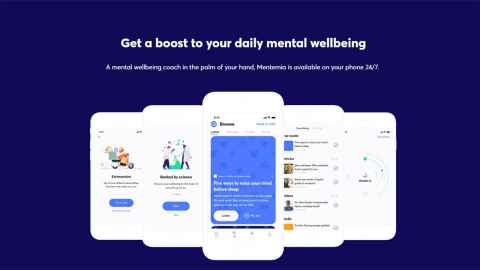Apps won’t save us from mental health crisis
7 September 2021
Opinion: Mental health apps may be effective for an 'average' western user, but not for those in severe distress or with varying degrees of digital access.

“Kiwis need mental wellbeing now more than ever” reads the homepage of mental wellbeing app Mentemia. “You’ll discover what things can help you feel more energised, more productive, and better equipped for whatever the world throws at you today.”
In the last decade, digital mental health technologies, especially apps, have become increasingly popular, with governments becoming attuned to their potential benefit. During Covid-19, governments worldwide began to invest heavily in these technologies. In New Zealand, apps like Mentemia and Melon were publicly funded as part of the Covid-19 health response.
Co-founded by All Blacks legend Sir John Kirwan, Mentemia was originally meant for the workplace, where businesses buy a subscription so their employees can access mental wellbeing tools. During last year’s Covid lockdown, the Government purchased a nationwide subscription, making the app available to the New Zealand public to help deal with the stress and anxiety associated with the pandemic.
While these apps offer opportunities to address rising levels of distress, our research suggests their use may not be a clear-cut solution to the mental health crisis. They are a helpful tool, but a tool that cannot (and does not intend to) help people in severe states of distress.
Many apps, like Mentemia, present mental health as something that should be ‘worked on’ every day, by everyone. Just as people are advised to exercise and eat a balanced diet to maintain physical health, these apps suggest we should also take time out for our mental health by practising mindfulness, deep breathing, and meditation, among other techniques.
By positioning lifestyle choices and active self-development as the pathway to wellbeing, such apps may also unwittingly contribute to a broader climate of healthism, wherein people are considered to be individually responsible for their health and wellbeing outcomes. Healthist views foster inequity by hiding social and structural influences from view, marginalising or even stigmatising those who fail to optimise their minds and bodies in line with mainstream expectations.
Many wellbeing apps are tailored to an imagined ‘average’ user in ways that implicitly reflect Western cultural norms. While there are exceptions (Le Va’s freely available Aunty Dee, for example), our analysis of the app Mentemia found little trace of non-Western content. So while apps like Mentemia seek to put forward a solution for ‘everyone’ to work on their mental health, they often direct their users towards a singular (and often Pākehā) understanding of wellbeing that fails to speak to diverse realities.
While accessibility is a positive aspect of the increasing digitalisation of mental health, mental health apps require a smartphone and a level of digital literacy not available to everyone. Pockets of digital inaccessibility will remain and will likely layer upon existing socio-economic disadvantages.
A similar limitation concerns the wider contexts within which apps are offered up as solutions to mental ill-health.
Preventing mental distress involves two forms of action. First, actions that address the causes of distress, like poverty, job insecurity, or substance use, which are themselves expressions of deeper causal factors, such as colonisation and a raft of political decisions about the distribution of services, income and wealth. And second, there are actions that respond to this distress.
Responding to distress involves actions that help make people happier or calmer about their situation, without necessarily changing the situation itself. Mental health technologies are often response-based technologies. While these apps often emphasise problem-solving and promote positive behavioural and cognitive change, they do not intend on solving the initial problems that may be causing distress in the first place.
New Zealand has alarming mental health statistics, particularly our youth suicide rates, which are among the worst in the world. While apps can be an effective part of public health strategy to help motivated and relatively ‘well’ people manage difficulties, or as a stop gap until help is available, they are not intended as a suitable standalone solution for the growing numbers of people who are really struggling.
As a tool for building ‘resilience’ to difficult circumstances - teaching us how to deal with a world that hurls problems at us every day - the increasing use of digital mental health technology by governments around the world is good news for those who see their world views and identity reflected in such technologies. Digital technologies offer ways to modulate your thoughts, feelings, and behaviours in a seemingly cost-effective and accessible way.
But they can’t, and don’t intend to, address the wider problems causing distress in the first place.
While digital mental health technologies have a clear role in support provision, they can never be the whole answer. They should not be approached by politicians as a silver bullet. Public funding for these kinds of technologies must be accompanied by robust evaluation data, substantial investment in ‘traditional’, community-focused mental health services and by meaningful, equity-focused action to address the root causes of mental distress.
Dr Tom Baker is a senior lecturer in human geography and Neil Lindsay is a masters student with a background in psychology and geography, both from the Faculty of Science. Dr Octavia Calder-Dawe is a lecturer in health psychology at Victoria University of Wellington, who studies sociocultural dimensions of health and well-being.
This article reflects the opinion of the authors and not necessarily the views of the University of Auckland.
Used with permission from Newsroom Apps won’t save us from mental health crisis 7 September 2021.
Media queries
Alison Sims | Research Communications Editor
DDI 09 923 4953
Mob 021 249 0089
Email alison.sims@auckland.ac.nz